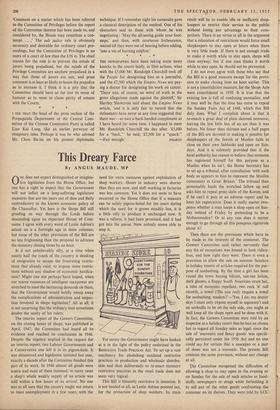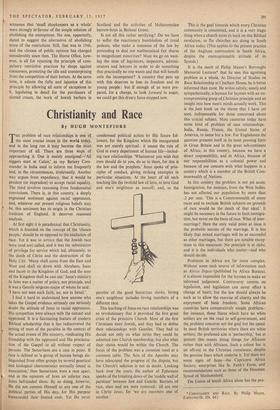This Dreary Farce
By ANGUS MAUDE, MP ONE does not expect distinguished or imagina- tive legislation from the Home Office; but one has a right to expect that the Government will not inflict on a long-suffering legislature measures that are ten years out of date and flatly contradictory to the known' economic policy of the Chancellor. Yet here is the Shops Bill still grinding its way through the Lords before descending upon an expectant House of Com- mons. I agree with every word of Leslie Adrian's attack on it a fortnight ago in these columns; but some of the other provisions of the Bill are no less frightening than the proposal to advance the statutory closing times by an hour.
Is it not unbelievably silly, at a time when nearly half the youth of the.country is thinking of emigration to escape the frustrating restric- tions that already exist, to impose more restric- tions without any shadow of economic justifica- tion? Might one not perhaps-have hoped, when our scarce resources of intelligent manpower are stretched to meet the increasing demands on them, that the Government would boldly sweep away the complications of administration and inspec- tion involved in shops legislation? All in all, it is not surprising that the ordinary man sometimes doubts the sanity of his rulers.
The interim report of the Gowers Committee, on the closing hours of shops, was published in April, 1947; the Committee had heard all its evidence and reached its conclusions in 1946. Despite the urgency implied in the request for an interim report, two Labour Governments and a Conservative one left it in its pigeon-hole. It was disinterred and legislation initiated last year, exactly a decade after the Committee finished this part of its work. In 1946 almost all goods were scarce and most of them rationed; in many cases a shop's whole weekly supply of an article was sold within a few hours of its arrival. No one was at all sure that the country might not return to mass unemployment in a ,few years, with the need for extra measures against exploitation of shop workers. Hours in industry were shorter than they are now, and shift working in factories was less common. Yet it does not seem to have occurred to the Home Office that if a measure can be safely pigeon-holed for ten years during which the need for it grows steadily less, it is a little silly to produce it unchanged now. It was a reform, it had been promised, and it had got into the queue. Now nobody seems able to stop it.
Yet surely the Government might have looked at it in the light of the policy enshrined in the Restrictive Trade Practices Act. To set up a vast machinery for abolishing outdated restrictive practices in production and wholesale distribu- tion and then deliberately to re-enact statutory restrictive practices in the retail trade does not seem very logical.
This Qill is blatantly restrictive in intention. It is not needed at all, as'Leslie Adrian pointed out, for the protection of shop workers. Its main result will be to enable idle or inefficient shop- keepers to restrict their service to the public without losing any advantage to their com- petitors. There is no virtue at all in the argument that a relaxation of restrictions would force small shopkeepers to stay open at hours when there is very little trade. If there is not enough trade to make it worth while to stay open, shops will . close anyway; but if one man thinks it worth while to stay open, he should not be prevented.
I do not even agree with those who say that the Bill is a good measure except for the provi- sion to make closing time an hour earlier. This is not a consolidation measure, for the Shops Acts were consolidated in 1950. It is true that the existing law is full of confusing anomalies; and it may well be that the time has come to repeal the Sunday Fairs Act of 1448, which this Bill duly does. What I complain about is that it re-enacts a great deal of plain damned nonsense, leaving the law little less of an ass than it was before. No' fewer than thirteen and a half pages of the Bill are devoted to making it possible for shopkeepers of the Jewish or Muslim faith to close on their own Sabbaths and open on Sun- days. And it is solemnly provided that if the local authority has reason to believe that someone has registered himself for this purpose as a Muslim when he isn't, the Home Secretary has to set up a tribunal, after consultation 'with such body as appears to him to represent the Muslim community in Great Britain.' The tribunal then presumably hauls the wretched fellow up and asks him to repeat great slabs of the Koran, and if he can't it puts in an adverse report and he loses his registration. Does it really matter two- pence whether a man keeps a shop open on Sun- day instead of Friday by pretending to be a Mohammedan? Or at any rate does it matter enough to go through all this pompous rigmarole about it?
Then there are the provisions which have to be made in the interests of the consumer. The Gowers Committee said rather nervously that any list of exceptions was bound to look ridicu- lous, and how right they were. There is even a provision to allow the sale on summer Sundays in holiday resorts of articles required for the pur- pose of sunbathing. By the time a girl has been round the town buying bikinis, sun-tan lotion, dark glasses, a floppy South American straw hat, a tube of mosquito repellent, two rock 'n' roll records, a towel ('Do you reels require a towel for sunbathing, madam?'—`Yes, I do; my doctor says I must only expose myself in segments') and an umbrella to be on the safe side, you might as well keep all the shops open and be done with it. In fact, the Gowers Committee were told by an inspector at a holiday resort that he had no choice but to regard all Sunday sales as legal, since the sale of 'souvenirs and fancy goods' was specifi- cally permitted under the 1936 Act and no one could say for certain that a saucepan or a pair of shoes was not a souvenir. The present Bill contains the same provision, without any change at all.
The Committee recognised the difficulties of allowing a shop to stay open in the evening or on Sunday for the sale of such articles as food- stuffs, newspapers or drugs while forbidding it to sell any of the other goods confronting the customer on its shelves. They were told by LCC witnesses that 'small shopkeepers as a whole' were strongly inelavour of the simple solution of abolishing the exemptions. No one, apparently, dared to suggest the alternative of abolishing some of the restrictions. Still, that was in 1946, and the climate of public opinion has changed considerably since then. The Home Office, how- ever, is all for retaining the principle of com- pulsory restrictive practices by shops against consumers, protecting the idle and unenterprising from the competition of their betters. At the same time, it admits the folly and injustice of this principle by allowing all sorts of exceptions to it, legislating in detail for the purchasers of clotted cream, the work of Jewish barbers in Scotland and the activities of Mohammedan barrow-boys in Bethnal Green.
Is not all this rather terrifying? Do we have to suffer the reactionary bumbledom of timid pedants, who make a nonsense of the law .by pretending to deal out mathematical fair shares to insignificant minorities? Must we go on wast- ing the time of legislators, inspectors, admini- strators and lawyers in order to do something that practically no one wants and that will benefit only the incompetent? A country that puts up with this deserves to lose its freedom and its young people : but if enough of us were pre- pared, for a change, to look forward in anger, we could get this dreary farce stopped now.



































 Previous page
Previous page